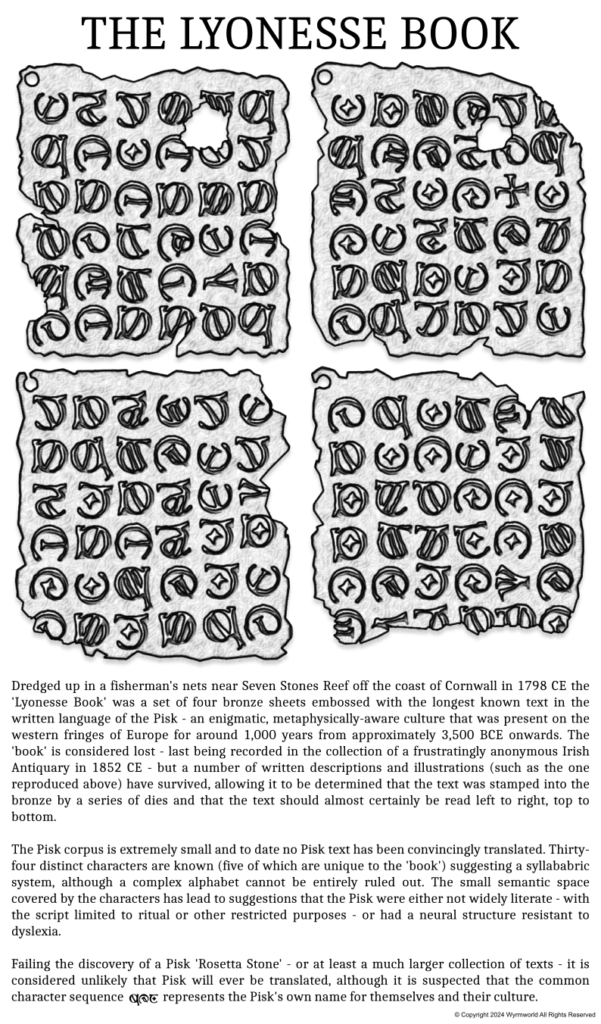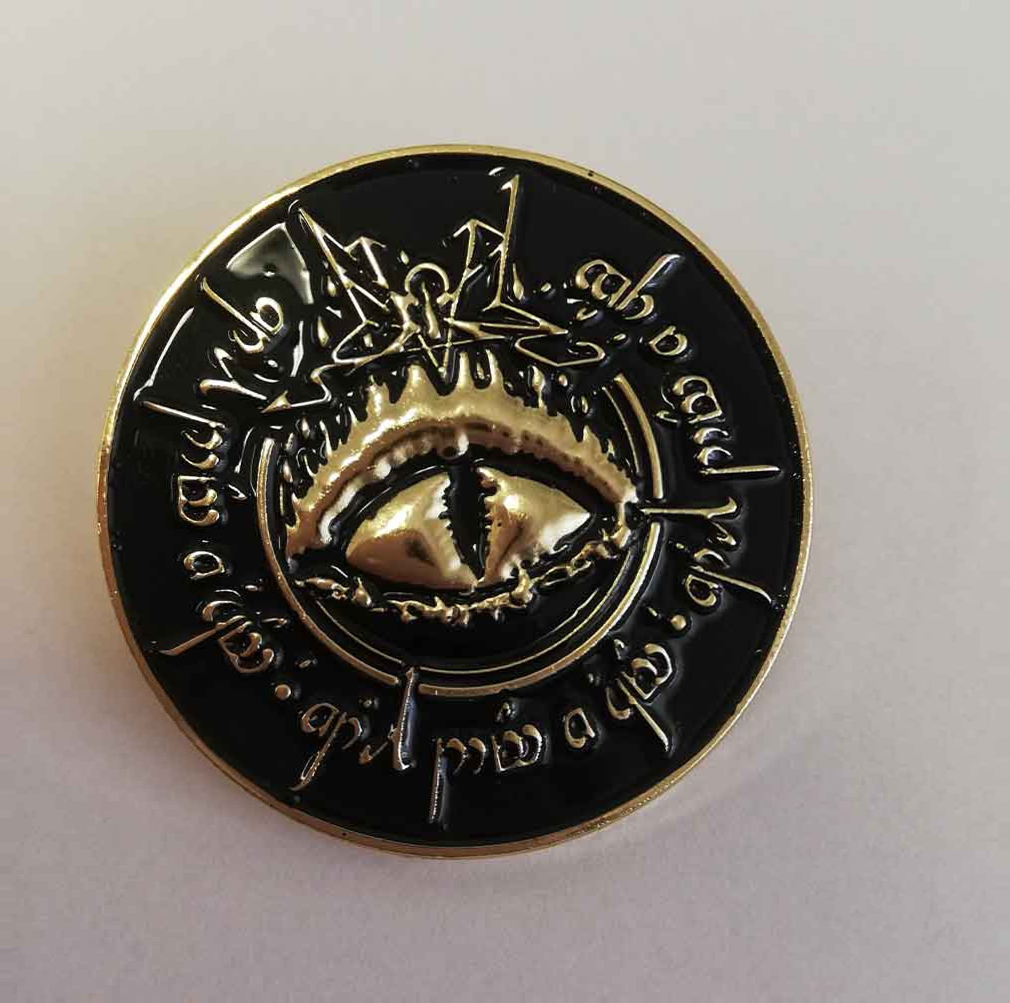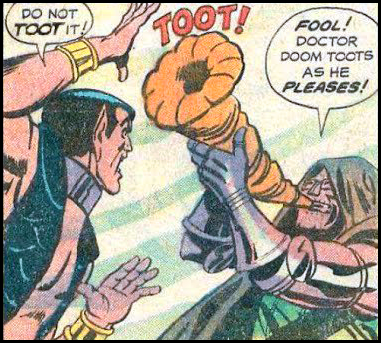Charli XCX: Talk to me in French, talk to me in Spanish, talk to me in your own made up language…
Me: Yuhàla Càlè! Zùvà holinjá, el pevomklá.
Charli XCX: SECURITY!!
Disordered Thoughts and Curmudgeonly Ramblings
Charli XCX: Talk to me in French, talk to me in Spanish, talk to me in your own made up language…
Me: Yuhàla Càlè! Zùvà holinjá, el pevomklá.
Charli XCX: SECURITY!!


Dredged up in a fisherman’s nets near Seven Stones Reef off the coast of Cornwall in 1798 CE the ‘Lyonesse Book’ was a set of four bronze sheets embossed with the longest known text in the written language of the Pisk – an enigmatic, metaphysically-aware culture that was present on the western fringes of Europe for around 1,000 years from approximately 3,500 BCE onwards. The ‘book’ is considered lost – last being recorded in the collection of a frustratingly anonymous Irish Antiquary in 1852 CE – but a number of written descriptions and illustrations (such as the one reproduced above) have survived, allowing it to be determined that the text was stamped into the bronze by a series of dies and that the text should almost certainly be read left to right, top to bottom.
The Pisk corpus is extremely small and to date no Pisk text has been convincingly translated. Thirty-four distinct characters are known (five of which are unique to the ‘book’) suggesting a syllababric system, although a complex alphabet cannot be entirely ruled out. The small semantic space covered by the characters has lead to suggestions that the Pisk were either not widely literate – with the script limited to ritual or other restricted purposes – or had a neural structure resistant to dyslexia.
Failing the discovery of a Pisk ‘Rosetta Stone’ – or at least a much larger collection of texts – it is considered unlikely that Pisk will ever be translated, although it is suspected that a common character sequence (i1, c5, f5) represents the Pisk’s own name for themselves and their culture.
It’s been unreasonably hot of late (maximums hovering around 40° for the last three days), which means that I’ve found it rather difficult to sleep. I’ve tried what I often do under such circumstances which is to stay up watching weird, late night TV until I can barely form a coherent thought (La Brea seems interesting, at least when horribly sleep deprived) then crawl into bed in the hopes of passing out, but it never actually works, so I’ve spent much of the last few nights tossing and turning while my brain whirls away like a merry-go-round with a broken speed governor.
(Do merry-go-rounds have speed governors? Is a speed governor even a thing? You can tell I’m not all here can’t you?)
Anyway, as I was writing in mental and physical torment last night my brain spat up a really silly idea, which was to attempt a translation of everyone’s favourite Dwarf song – Diggy Diggy Hole – into Khuzdul, the language of J. R. R. Tolkien’s Dwarves.
What do you mean you don’t know Diggy Diggy Hole?! What have you been doing with your life?! Here’s Wind Rose’s version to get you up to speed.
Anyhoo, translating it isn’t quite as crazy as it seems because we don’t really know a lot about Khuzdul words and grammar – which gives me plenty of scope to just make things up!
So I looked up what scraps of the language we actually have, and threw in the Neo-Khuzdul lyrics of The Bridge of Khazad-dûm from the Lord of the Rings soundtrack which helpfully provides a basic grammar and a number of words found in Diggy Diggy Hole despite being wildly different in tone.
And here it is! The first verse and chorus of Diggy Diggy Hole translated into what we might call Neo-Neo-Khuzdul…
FELEKA TÛM
Gûza mêngalaribarâ!
Mênfelakarâ khul!
Mêntakarâ felak lamâ!
Mênorodalarâ khul!
Mâsalani buzra zar
Mak tabandi bazanar
Gilim samil, zigil, nim
Abilul sanzigil bin!
Mâbala ni buzra
Kûman taranasha mâ
Mâzikada ni aznân
Suruk ni kathalamâ
Paragul kurdumâ
Sanbaragul bishkumâ!
Feleka tamahaldi rûza
Mênorodalarâ gûza!
Khahali Khuzd
Ra khafeleki tûm!
Khafeleki tûm!
Khafeleki tûm!
Khahali Khuzd
Ra khafeleki tûm!
Khafeleki tûm!
Feleka tûm!
Translated back to English…
DIGGING A HALL
Brothers you will rejoice!
Dig with me!
Use our tools and voices!
Sing with me!
Deeper and deeper we go,
No one knows what lies beneath,
Shining gems, silver, gold,
Mithril hidden deep!
We were born underground,
Nourished by stone,
We grew in the dark,
Secure in our mountain stronghold,
Our skin is iron,
Our bones are steel,
Digging makes us free,
Brothers sing with me!
I am a Dwarf,
And I’m digging a hall,
I’m digging a hall,
I’m digging a hall,
I am a Dwarf,
And I’m digging a hall,
I’m digging a hall,
Digging a hall,
And finally for those who care about such things, a line by line gloss…
Gûza mêngalaribarâ
all-brothers you-celebrate-imperative
Brothers you will rejoice!
Mênfelakarâ khul
you-delve-imperative me-with
Dig with me!
Mêntakarâ felak lamâ
you-use-imperative tool voices-our
Use our tools and voices!
Mênorodalarâ khul
you-sing-imperative me-with
Sing with me!
Mâsalani buzra zar
We-descend-are deeps more
We go deeper and deeper
Mak tabandi bazanar
No-one it-know-are below-things
No one know what lies below
Gilim samil, zigil, nim
Shining gems, silver, gold
Shining gems, silver, gold
Abilul sanzigil bin
hidden true-silver beneath
Mithril hidden below
Mâbala ni buzra
we-born-were in deeps
We were born underground
Kûman taranasha mâ
stone it-nourish-did us
Nourished by stone
Mâzikada ni aznân
we-grow-did in darkness
We grew in the dark
Suruk ni kathalamâ
secure in mountain-stronghold-our
Secure in our mountain stronghold
Paragul kurdumâ
iron-of skin-our
Our skin is iron
Sanbaragul bishkumâ
true-iron skeletons-our
Our bones are steel
Feleka tamahaldi rûza
To-dig it-create-does freedom
Digging creates freedom
Mênorodalarâ gûza!
you-sing-imperative all-brothers
All brothers sing!
Khahali Khuzd
me-be-am dwarf
I am a dwarf
Ra khafeleki tûm
and me-dig-am underground-hall
And I’m digging a hall
Khafeleki tûm
me-dig-am underground-hall
I’m digging a hall
Khafeleki tûm
me-dig-am underground-hall
I’m digging a hall
Khahali Khuzd
me-be-am dwarf
I am a dwarf
Ra khafeleki tûm
and me-dig-am underground-hall
And I’m digging a hall
Khafeleki tûm
me-dig-am underground-hall
I’m digging a hall
Feleka tûm
to-dig underground-hall
To dig a hall
So there you go. I’m done for the day. Mênmahaldarâ laramâ! (make your own entertainment)
For years now there’s been a post rattling around in my head on the subject of how both literalist American fundamentalists and angry American atheists suffer from a complete misunderstanding of what the Bible actually is, but I can never seem to find the time to write it up. It’s very interesting and includes unicorns, so keep an eye out for it. In the meantime though I’ve been thinking about the particular instance of the Tiffany Problem as found in the historical books of the Old Testament.
(You don’t know about the Tiffany Problem? Put briefly it’s that there are things that are actually really, really old, but which seem so modern that if you include them in a historical work it looks like a mistake. Like the name “Tiffany” which dates from the 12th century, but would completely freak people out if used in a film about, say, Henry VIII.)
Western society (for better or worse) has been massively influenced by the Bible, and as a result a lot of names we assume are perfectly ordinary, modern names are actually taken from it. This means that if you’re reading one of the Old Testament history books (which you should – they’re filled with enough bizarre events, weird claims and insane, gory violence to put Game of Thrones to shame) you get this exhilarating mental whiplash effect…
…And so KING GABILGATHOL did marry the eldest daughter of JERABOSOPHAT, “abigail”, and she bore unto him a son he named IGLISHAMEK for he was like unto the thunder of the mountains, and IGLISHAMEK was blessed by the HIGH PRIEST ZIRAK-ZIGIL and the Prophet “nathan”…
Seriously, there’s a prophet named “Nathan” in there, which is the kind of name you’d usually associate with a guy who spends all his spare time playing darts down the pub.
Anyway, that’s all I had to say.
Gur, gur beltàdlet kert ná…
Ròmanár gur pevgetslá koro modá ibiŝan darak pevnánûglá.
Spanolár badmâ pevorklá kâ aknà iskan badrokâ itatâ.
Itlá Dîŝlan idráurn pevorestlá poro admo bárizûurn darakâ.
Garad, gur beltàdlet kert ná.
Gur, gur belt-ayed-let kairt nah.
Roman-ar gur pev-gets-lah, koh-roh moh-dah ibishan darak pev-nan-oo-glah.
Span-olar badmor pevor-klah, kor ack-nay iskan bad-rockor itah-tor.
It-lah Doysh-lan idrah-urn pevor-est-lah, poh-roh ad-moh bah-riz-or-urn dara-kor.
Garad, gur belt-ayad-let kairt nah.
WAR, WAR WILL-CHANGE-ITSELF NO !!
ROMAN-PEOPLE WAR DID-PERFORM TO PLURAL SLAVE MONEY DID-SEIZE.
SPANISH-PEOPLE EMPIRE DID-BUILD BY THEIR DESIRE TREASURE-CONCERNING LAND-CONCERNING.
HITLER GERMANY BROKEN DID-REPAIR CAUSE COUNTRY VERY-POWERFUL MONEY-CONCERNING.
DEPSITE-THIS, WAR WILL-CHANGE-ITSELF NO !!
Have your teens been caught up in the ‘Thinking about the Roman Empire’ trend? Watch for these codewords!

Hider thende. Ich lǒve hider thende.
Not long ago someone posted the following image (which I have shamelessly stolen) to one the Tengwar subreddits, asking for a translation.

(For those not in the know the Tengwar is the writing system devised by J.R.R.Tolkien for his Elvish languages. It’s very pretty but horribly impractical – the Elves were probably plagued with dyslexia.)
Two facts were quickly established. That the squiggly bits above the eye are the logo of the Tolkien themed, Austrian, atmospheric-black-metal band Summoning, and the writing is complete gibberish, a repetition of something like ait-h dom a chon. Case closed.
Except something about the whole thing nagged me. The photo is obviously of a manufactured item, probably a promotional item for the band, and likely made of metal. It seemed unlikely that the band – either as professional musicians or Tolkien fans – would go to all the trouble of making such a thing and then just stick a bunch of random letters on it. Surely it’s meant to mean something?

The first possibility was that it’s written in the Mode of Baloneyland. “Mode of Baloneyland” is a very funny pun, but you need to understand a few things about the Tengwar before you can understand it. Now, I could skip over this in the name of not boring the hell out of you, but this is my blog, and I write as I please!
Tolkien was a linguist (specifically a philologist), and he made his Elves linguists as well. As such the writing system he invented for them was not simply an alphabet, it was system that could be used to write any language. Each individual consonant (tengwa) is built out of components indicating the basic sound it represents, but it can be reassigned to another value depending on the needs of the language being written. The exact assignment of letters to sounds is called a mode, with examples in Tolkien’s works including the General Mode, the Classic or Quenya Mode, and the Mode of Beleriand.
This flexibility means that the Tengwar does not easily map to a computer keyboard. For a start you need to know what mode you’re writing in – the tengwa súle for instance represents “s” in Quenya Mode and “th” in General Mode. What key should that be mapped to? Also there’s two ways to represent vowels. In General and Quenya mode they’re indicated with marks (tehta) above the tengwa, but in the Mode of Beleriand they have their own dedicated tengwa – so should the ‘E’ key put a dot above a letter or print out the character yanta? It’s a nightmare!
As such, tengwar fonts don’t try to set up a correlation between the letters on the keys and the tengwar they print. They simply make all the tengwar available and rely on the person typing to know what they’re doing. Inevitably many people don’t know what they’re doing and try to write in “Elvish” by typing in a phrase in English and then switching it a tengwar font. Among tengwar enthusiasts the resulting gibberish is referred to as “The Mode of Baloneyland”. Get it? Like the Mode of Beleriand, but absolute baloney. See? I told you it was funny!
(Please laugh)
Now, if the text was written in the Mode of Baloneyland there would be no way to decipher it without knowing the mapping of the specific font it was written in. I decided to ignore this dead end and assume that whoever wrote it had some idea of what they were doing, but were just really bad at using the tengwar. So, I hopped over to Summoning’s Wikipedia page to look for any clues. I quickly discovered that in 2018 they released an album named “With Doom we Come”. Hmmm, not unsimilar to ait-h dom a chon…
A closer look at the image shows that the Redditor who translated the inscription as ait-h dom a chon missed a few things. Firstly the questionable quality of the metal casting makes it a bit tricky to tell for sure, but the final númen (‘n’) could actually be malta (‘m’), rendering it ait-h dom a chom. Secondly there are marks above the space before chom and the divider between repeated spaces – ait-h dom a’chom‘. These are clearly orphaned ‘e’s – when a tehta cannot be written above a letter it’s supposed to have a carrier (like a lowercase “i” without the dot) placed beneath it. This makes the phrase ait-h dom ae chome.
We’re making progress! The “t-h” on the end of the first word is clearly a result of the writer not realising that there’s a single tengwa for the “th” combination, but what’s with the ‘a’s? A consultation of a tengwar chart gives us the answer. While the character resembles osse – used to represent ‘a’ in the Mode of Beleriand – it’s actually not a valid tengwa at all! It’s the character vala (‘w’) printed backwards! So we’ve now decoded our way to with dom we chome.
Consulting a chart also solves the problem with “ch”. Whoever wrote out the phrase forgot to add a line to the tengwa calma (‘ch’), which would have transformed it to quesse (‘k’). Fix this and we have with dom we kome.
There’s still the issue that the first ‘o’ should have been doubled, but we’ve successfully demonstrated that the inscription is a really incompetent attempt at writing With Doom We Come.
For purposes of comparison here are the inscription as written, and how it would be written properly in both the orthographic (based on spelling) and phonetic (based on sounds) English Modes – all generated via Tecendil which is the only Tengwar transcriber you should use!



So in conclusion, perhaps get someone to check over your tengwar before sending merchandise for production, Summoning!
MALO
I would rather be
MALO
In an apple tree
MALO
Than a naughty boy
MALO
Stabbed to death in a Deptford boarding house
(This is really sophisticated literary joke so don’t feel bad if it goes over your head – we can’t all have minds of astonishing genius…)
The Worst of Perth has recently alerted me to the fact that Bayswater Councillor Sally Palmer has of late been peddling some truly atrocious poetry on the subject of a concrete plant being constructed on Collier road.
I know nothing about Ms Palmer’s politics, and while I have not been aware of plans for a concrete plant on Collier road I can see why such a proposal seems like a bad idea. One thing I do know however is what makes for a half decent poem, and I can say with certainty that “Black Cockatoo Calling” is probably the worst bit of poetry foisted on the people of Bayswater since Gina Rinehart defiled Morley with her poorly composed plea for less government regulation on the activities of disadvantaged mining billionaires.
It is a basic rule of English poetry that you can’t rhyme a word with itself – it’s cheating. Yet Ms Palmer rhymes “lands” with “lands”, “accord” with “accord” and “earth” with “earth”. Another rule is that of meter and scansion – lines should follow a uniform pattern of syllable count and stress. While not as bad as Ms Rinehart in this respect Ms Palmer still breaks meter all over the place. A basic understanding of grammar is also expected – I don’t think the construction “to do contamination” would pass muster in any high school English class, let alone “to do bad contamination”.
The horror engendered by reading Ms Palmer’s poetic burp got me wondering – how is it that apparently intelligent people can spew up the kind of doggerel that would embarrass William McGonagall but then be proud enough to put it on display for all to see? After some thought I think I’ve figured it out…
We all wrote poems in primary school. And almost all of them were awful. Awful, terrible atrocious poetry. But because we were young and just learning how to write and compose, our teachers encouraged us. A poem like “Black Cockatoo Calling” would get any 10 year old a gold star and maybe a special certificate from the school principal, despite its many obvious faults. And there’s nothing wrong with that whatsoever.
The problem arises when the 10 year old internalises the message “I’m a good poet!” and goes on through high school, and maybe university, without ever writing another poem. They never have cause to write more poetry, and never get any feedback that would let them know that their poetic skills have failed to grow beyond the levels of that 10 year old, and are – in a grown adult – simply an embarrassment. Throw in a desire to express strongly held beliefs about mining regulations or concrete plants and the stage is set for a horrible, poorly composed screed to be vomited out into the world, generating untold suffering and trauma.
If I get the time I may rewrite Ms Palmer’s poem into something more acceptable. But then again I may not. I am rather busy at the moment.